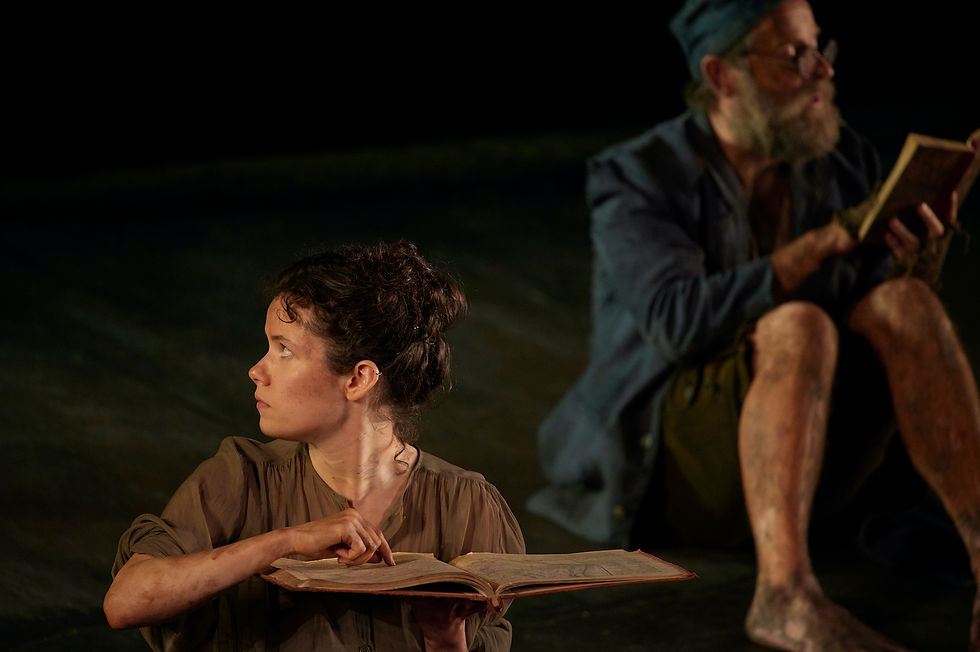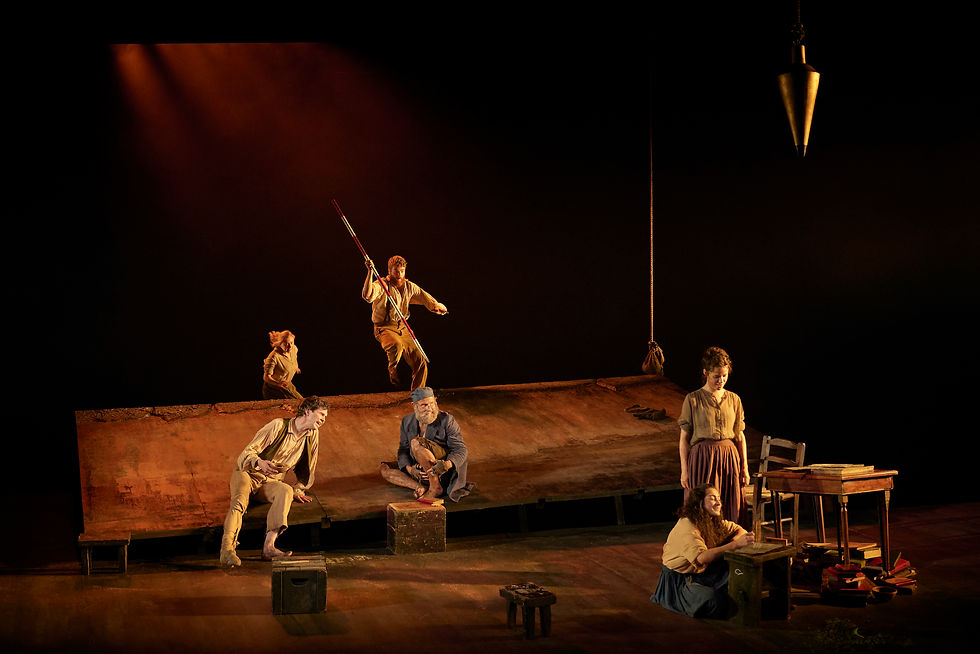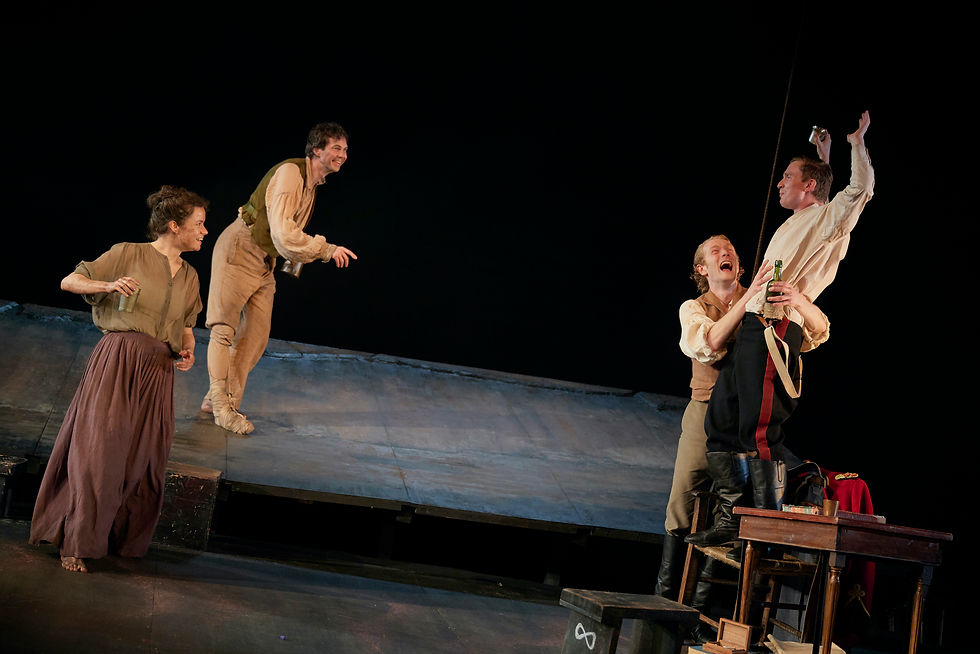Translations
- Chris O'Rourke
- Jun 17, 2022
- 3 min read

Leonard Buckley, Marty Rea, Ronan Leahy and Aidan Moriarty in Translations. Image by Ros Kavanagh.
****
To some, Translations is the jewel in Brian Friel's heavily encrusted crown. To others, it simply doesn't warrant the level of reverence it enjoys. A play that impacted in 1980 when it contentiously premiered at the Guildhall, Derry, its political themes in that troubled climate forgave it some theatrical failings. Including an overbearing sense of verbiage (from the Latin verbosus, meaning wordy). Long, large etymological tracts which leave many arguing it's not really a great play after all, or indeed, even one of Friel's greatest plays.

Zara Devlin and Ronan Leahy in Translations. Image by Ros Kavanagh.
If its cultural and historic importance cannot be overstated, theatrically Translations can make for a long night. With certain aspects not sitting quite as well over forty years later. Set in Ballybeg, Co. Donegal in 1833, a motley crew of Irish peasants from an Irish speaking hedge school are impacted by British soldiers tasked with creating an ordinance survey map of Ireland, and of standardising and anglicising all local place names. Bringing civilisation to the backward savages, a new school where only English is taught, and thought, also signals changing times. Some, seeing the writing on the wall, want to embrace the new regime and their language. Others want no part of it. Yet the British are a dangerous breed to defy. Or worse, to emulate or fall in love with.

Marty Rea and Zara Devlin in Translations. Image by Ros Kavanagh.
Throughout, Friel nicely complicates relations while highlighting the erosion of Irish language, culture and identity under English colonial rule. While the English entertain romanticised notions about the Irish, the Irish spout Latin, learn maths, and discuss Athena and Troy. Yet under Caitríona McLaughlin's direction, Friel's roguish, rakish, romantic Irish serve up a pill to choke on rather than swallow, never living up to McLaughlin's powerful opening image. Like the Irish in an Ealing comedy, cripples, mutes, and idiot scholars all, the Irish are devious drunks with passionate hearts, a playful disposition and like to party. Comic foils secretly smarter than the heartless, ramrod, militaristic English. Apart from the insufferable romantic Lieutenant Yolland. Two minutes in his cloying company is to restore your belief in hell and eternity. With the enthusiasm of a child endlessly flushing a toilet, he catches Irish cailin Marie's eye with his soft hands, lovely accent and schoolboy innocence. And possibly the eyes of the nationalist Donnelly brothers. Who, if they decide, might bury him somewhere unlikely to show up on any of his maps. The longer he rambles on, the more you're likely to think, 'now would be nice.'

Translations. Image by Ros Kavanagh.
Joanna Parker's tilted set, steeped in a light fog like the mists of time, cleverly evokes a range of spaces which Paul Keogan's lights deepen like a memory. Carl Kennedy's sound, and some marvellous keening-like songs between scenes, haunt the darkness with all the Celtic twilight you could hope for while reaching beyond the limits of language, space and time. Creating an experience in which an extraordinary cast turn in extraordinary performances across the board. A superb Marty Rea as the troubled Manus foregrounds the pull of the future and the past. Zara Devlin's Marie and Aidan Moriarty's Yolland deliver one of the plays crowning scenes, uniting conflicting humanities as different yet the same struggles to connect world with world. A phenomenal Ronan Leahy is out of this world as Jimmy Jack, a man who can recite large tracts of Latin yet whose only word of English is bow-somes. Leahy lighting up the final, unsatisfying scene, which plays like a Beckettian version of King Lear. In which Leahy's fool and Brian Doherty's fallen king, Hugh, channel more mild, Irish pomposity. Hugh drunkenly whining into the night as the future looms in a great hunger just around the corner.

Zara Devlin, Marty Rea, Leonard Buckley and Aidan Moriarty in Translations. Image by Ros Kavanagh.
For some, Translations offers tourist trap theatre for those looking for an Oirish experience. They could do worse. If pace plods at times, when its heart and humour hit home, Translations has the power to move you. And when you take stock of what you're seeing, a part of history many never knew, you're as likely to agree that even if Translations might not be Friel's greatest play, it's still one of his most important.
Translations by Brian Friel, directed by Caitríona McLaughlin, an Abbey Theatre and Lyric Theatre co-production, runs at the Abbey Theatre until August 13 before going on tour:
Lime Tree Theatre, Limerick: August 16 - 20
Town Hall Theatre, Galway: August 23 - 27
An Grianán, Donegal, August 30 - September 3.
For more information, visit The Abbey Theatre or respective venues.










































